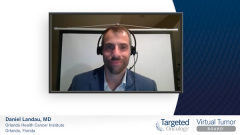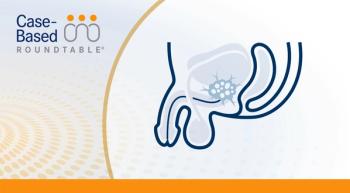
Nonmetastatic CRPC: Importance of Patient Risk Status and Genetic Testing
A brief review of the prevalence of familial risk and other high-risk factors for prostate cancer, followed by recommendations for patient follow-up and genetic testing.
Episodes in this series

Transcript:
Alan Bryce, MD: Dan, let’s talk about this case. What are your initial impressions of our gentleman who has started on ADT [androgen deprivation therapy]? Speak to your practice and the patient’s journey in these situations, how they’re reacting, and their understanding of this.
Daniel Landau, MD: This patient, at 1 point in their care, had become lost to follow-up, which unfortunately comes up quite a bit in my practice. That often speaks toward the patient’s understanding of the disease. I’m thinking about it more from the standpoint of a chronic illness rather than a potentially aggressive cancer. Unfortunately, this is a situation that we come across quite a bit. Similar to the case presented, I’ve worked with a number of patients who’ve come back after having a very low PSA [prostate-specific antigen] after primary therapy to suddenly having a PSA in the double digits if not higher. Unfortunately, this is a situation I’ve dealt with a number of times.
Alan Bryce, MD: There are 2 parts of the initial stem. They drive other conversations. One is the family history: mother with breast cancer, and father with pancreatic cancer. Eleni, you just got back from the big European conversation about management [Advanced Prostate Cancer Consensus Conference]. What do we need to tell our listeners? This stem should be triggering something.
Eleni Efstathiou, MD, PhD: Alan, this is a great point. This is screaming for germline testing. As a person practicing [in the United States], even though my origins are European and I practice there too, it seems that they’re left behind on that side of things. [In the United States], we have guidelines that allow us—the moment a gentleman with high-risk disease walks in the door, we can perform germline testing. They don’t have these guidelines [in Europe]. Given that we have the guidelines, we have ease to get reimbursed for these tests. For me, for a number of reasons—and Daniel mentioned it—some of these men are lost to follow-up. There’s a big ethical consideration. This man probably has kids. The moment he walks in, I do a test. I’ve just put it in the blood draw. [I say] “Hi, how are you? We’re going to have a blood draw now.” I explain the reasons. If it’s positive, I move to the geneticist. This works very systemically in my clinic. This is thanks to being at Houston Methodist, which is more open to that perception. I don’t know how the practices are in your practices. I don’t have that roadblock of genetic counseling. Our guidelines are pretty clear. We can offer it to this gentleman. If it’s positive, we move on to the next step. Importantly, if we know that he has a BRCA1 or BRCA2 and ATM, we also know that he'll have a pretty grim prognosis, and we’ll stack up our options faster. I don’t know how you practice in your settings.
Daniel Landau, MD: Your points are very well taken. It’s a conversation that I’m having with increasing frequency with my patients, especially because the guidelines reflect that any patient with metastatic disease or high-risk disease should be offered a genetic testing. I’m speaking about it much more commonly with my patients. I’ve found that a number of patients have relative hesitation about doing the test. It requires quite a bit of explanation, especially because a number of patients don’t have that family history or don’t know their family history, but we’re still recommending testing for them. As time is going on, we’re recognizing the importance of this and getting that message to patients that it’s more than just learning about what’s running in your family. It’s also about how we’re going to treat you in the long term, which becomes a very important message.
Alan Bryce, MD: I agree entirely. It’s the same in my practice. At the Mayo [Clinic], we order the test first. I counsel the patient. I quote them a 10% to 15% chance of being a germline carrier for a cancer, a predisposition gene just based on having high-risk prostate cancer. That’s far apart from this dramatic family history that we see here. That’s probably underappreciated. We don’t talk about it enough, but if you take all comers with no family history, right off the bat you have a 10% to 15% likelihood of being a germline carrier.
Like both of you, I’m finding that patients are very receptive to this. At this point, it’s very uncommon that a patient would say no because it impacts both their care and their family—all their first-degree relatives. I’m sure you’ve experienced this as well. In our practice, we order a full germline testing panel, which includes all the genes on the American side of human genetics recommendation list. The result is that you find some germline aberrations that you’re not expecting. I have a handful…from many patients, and that matters. You get them for their colonoscopy. You’re protecting their family as well. Not everything is DDR genes. It’s not just prostate genes. I encourage listeners to order the full panel. You may not realize that when you send the blood for testing that all these testing companies run only 1 panel. The difference is what results they bother to report to you. If you ask for the BRCA panel, they report those results and just hide the rest. Why would you bother hiding anything that’s been tested? We’ve fully explored that issue, but it’s very important for everyone to pick up on this.
Transcript edited for clarity.












































